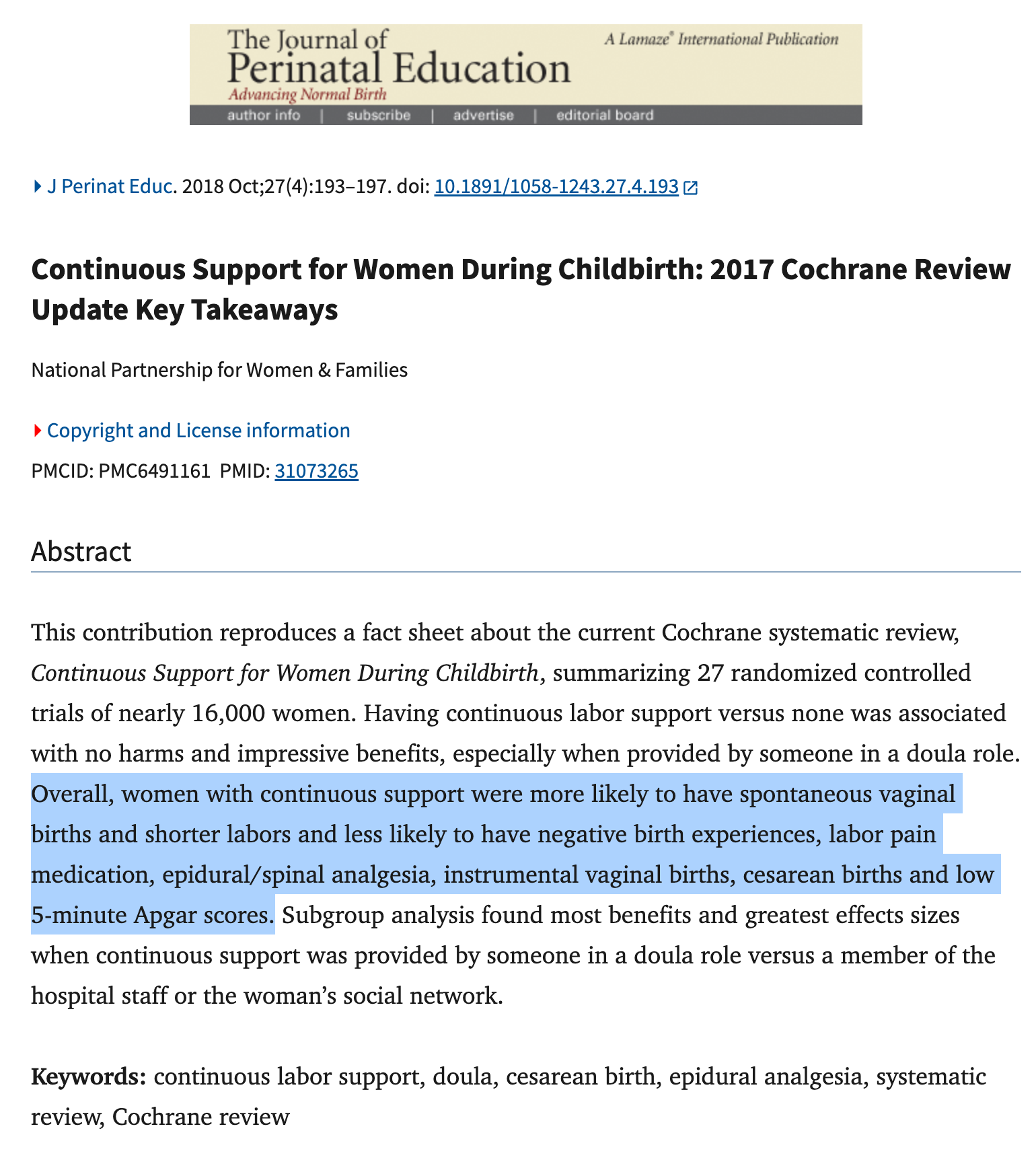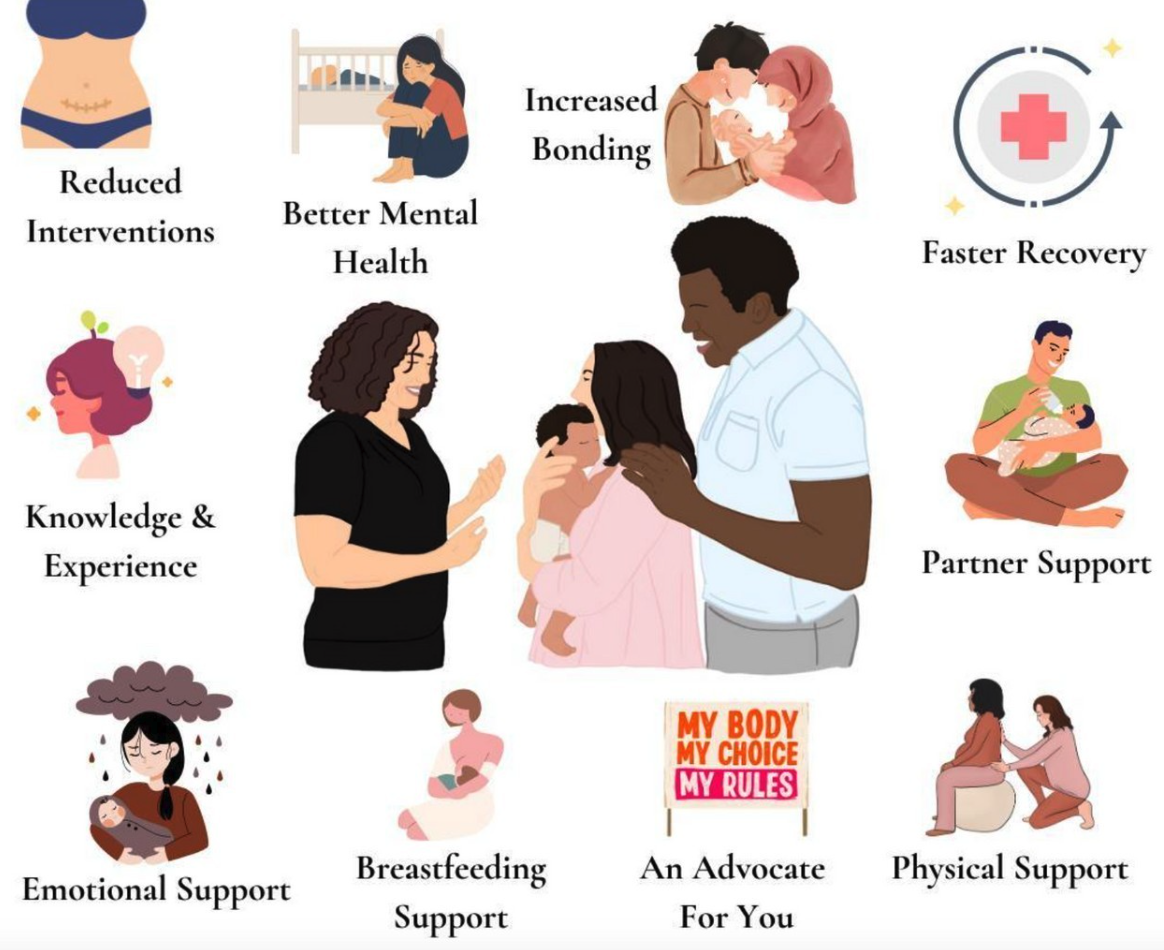IN THIS LESSON
Topics Covered:
Evidence-based research on the impact of doulas on birth outcomes
Benefits of continuous labor support for birthing families
How doulas reduce the need for medical interventions and cesarean sections
Emotional and psychological benefits of having a doula
Introduction
Bringing a new baby into the world is both exciting and overwhelming, and families often need extra support during labor and the early days of parenting. Research shows that having a doula—a trained professional who provides continuous emotional, physical, and informational support—can make a real difference. Doulas are not medical providers, but they work alongside doctors, nurses, and midwives to ensure families feel safe, heard, and cared for. In this lesson, we’ll explore how doula support improves birth outcomes, reduces the need for interventions like cesarean sections, and strengthens families’ emotional and psychological well-being.
Evidence-Based Research on the Impact of Doulas on Birth Outcomes
Over the past several decades, research has shown that having a doula—someone trained to provide emotional, physical, and informational support during childbirth—can make a big difference for both birthing individuals and their babies. Unlike medical staff, who must focus on the clinical side of care, doulas are fully dedicated to the comfort, confidence, and well-being of the family throughout labor.
A number of scientific studies, including those summarized in the well-known Cochrane Review, consistently demonstrate that continuous support from a doula leads to better birth outcomes. These improvements are not just about shorter labor or fewer medical procedures—they also extend to how parents feel about their birth experience. Below are the main benefits explained in everyday language:
Shorter Labor Duration
When a doula is present, labor often takes less time. Doulas provide continuous encouragement, calming words, massage, breathing guidance, and reassurance. These forms of support can help reduce fear and tension, which in turn allows the body to relax and work more effectively during labor. Research shows that women supported by doulas tend to have shorter labors on average than those without such support.
📦 Pro Tip: Relaxation during labor is key. The more supported and safe a birthing person feels, the less likely stress hormones will interfere with the natural process of labor.
Lower Use of Medical Interventions
Medical interventions such as epidurals, forceps, or vacuum deliveries can sometimes be necessary, but they also carry risks and side effects. Women who have doulas by their side are less likely to need these interventions. This is partly because doulas help the birthing person stay calm, cope with pain naturally, and feel more in control—reducing the chance of medical procedures being required.
💡 Did You Know? Studies show that continuous emotional support can decrease requests for epidurals and reduce the overall need for unplanned interventions.
Reduced Risk of Cesarean Sections
Cesarean births (C-sections) are sometimes lifesaving, but they are major surgeries that come with longer recovery times and higher medical risks. Studies show that women supported by doulas are less likely to need a cesarean. The presence of a doula can boost confidence, lower fear, and encourage the birthing person to trust their body, all of which reduce complications that might otherwise lead to surgery.
📦 Pro Tip: A calm, confident environment lowers the chance of stress-related complications that might lead to surgery. Doulas help create that environment.
Higher Satisfaction with Birth Experience
Giving birth is not just about the physical process—it is also an emotional experience that parents carry with them for a lifetime. Mothers who are supported by doulas report feeling more satisfied with their birth. They often say they felt listened to, respected, and empowered to make choices. This sense of control and support contributes to a more positive memory of the birth, even if unexpected challenges arise.
💡 Did You Know? Research shows that people who feel supported and respected during labor often describe their birth as empowering—even if the outcome wasn’t exactly what they originally planned.
Key Studies to Note
The Cochrane Review (2017): This large analysis of studies found that continuous labor support, especially from doulas, increases the likelihood of spontaneous vaginal birth and improves overall satisfaction with the birth process.
The Journal of Perinatal Education (2013): This study showed that women who received doula care were more likely to report positive experiences and less likely to use pain medication or undergo medical interventions.
Key Terms and Definitions
Doula: A trained professional who provides emotional, physical, and informational support before, during, and shortly after childbirth. Unlike doctors or nurses, doulas do not provide medical care but instead focus on the birthing person’s comfort and confidence.
Continuous Labor Support: Ongoing support provided throughout the entire labor without leaving the birthing person. This can include encouragement, comfort measures, and advocacy.
Medical Interventions: Procedures used to assist childbirth, such as epidurals (pain relief injections), inductions (starting labor with medication), or assisted deliveries with tools like forceps or vacuums.
Cesarean Section (C-Section): A surgical procedure in which a baby is delivered through an incision in the mother’s abdomen and uterus. Often necessary in emergencies but generally involves longer recovery times compared to vaginal birth.
Satisfaction with Birth Experience: How a birthing person feels about their labor and delivery process. Satisfaction is influenced not just by medical outcomes but also by emotional support, decision-making involvement, and respect from the care team.
What Doulas Do, What Doulas Don’t
Featured Study
Bohren, M. A., Hofmeyr, G. J., Sakala, C., Fukuzawa, R. K., & Cuthbert, A. (2017). Continuous support for women during childbirth. Cochrane Database of Systematic Reviews.
Reference (APA): https://www.ncbi.nlm.nih.gov/pmc/articles/PMC6483123/
Summary
This large Cochrane systematic review analyzed data from over 15,000 birthing people across multiple countries. It found that continuous labor support significantly reduced the likelihood of cesarean birth, instrumental vaginal birth, and the use of pain medications. People who received continuous support were more likely to report positive birth experiences and shorter labors. Support was especially effective when provided by someone whose sole role was emotional and physical support, such as a doula. The benefits were consistent across hospital settings. No harms associated with continuous support were identified. The findings strongly support the presence of continuous labor support during childbirth.
What It Means to Birth Doulas
This review provides some of the strongest evidence supporting doula work worldwide. It confirms that continuous presence—not medical intervention—is a key factor in improving birth outcomes. Doulas offer a unique form of care that clinicians, who rotate shifts and manage multiple patients, cannot replicate. The findings reinforce that doulas are most effective when they are not part of the hospital staff and are dedicated solely to the birthing person. This research supports doulas advocating for uninterrupted support during labor. It also validates doula care as evidence-based, not anecdotal. Doulas can confidently reference this review when explaining their role to clients or healthcare teams.
Translating for Clients
Suggested Script:
“Large studies across many countries show that having continuous support during labor lowers the chance of cesarean birth and helps people feel more positive about their experience.”
You can explain your role clearly:
“My job is to stay with you throughout labor—emotionally and physically—so you’re never navigating it alone.”
Help clients understand the value of presence:
“Research shows it’s not just what support is given, but the fact that someone is consistently there.”
Encourage questions and preferences to tailor support to their needs.
Hands-On Consultation
-
Context: A couple is weighing the cost of hiring a doula and asks, “Do doulas actually change birth outcomes?”
Suggested Doula Response:
“I completely understand your question. Research shows that families with doula support often have shorter labors, reduced need for interventions, and higher satisfaction with their birth experience. My role is to make sure you feel informed, supported, and cared for throughout your journey.” -
Context: A partner says, “If you’re here, will I still be important in the process?”
Suggested Doula Response:
“My role isn’t to replace you but to support both of you. Evidence shows that when doulas and partners work together, families report feeling more connected. I’ll guide you on ways to comfort your partner, so you remain central in this experience.” -
Context: A client shares, “My doctor said doulas aren’t necessary.”
Suggested Doula Response:
“I respect your doctor’s perspective. What research shows is that doulas work alongside medical teams to provide continuous non-medical support. I don’t make medical decisions, but I help you communicate with your provider, reduce stress, and keep your preferences front and center.”
2. Benefits of Continuous Labor Support for Birthing Families
Unlike medical staff who may rotate during shifts or juggle multiple patients, a doula provides continuous support throughout the entire labor. This uninterrupted presence can make a tremendous difference for birthing families. While doctors and nurses focus primarily on the medical side of birth, doulas stay focused on the emotional, physical, and informational needs of the family. Research shows that this type of consistent support not only helps the birthing person feel calmer but also improves outcomes for both mother and baby.
Here are the key benefits explained in beginner-friendly language:
Uninterrupted Attention
Doulas remain fully present with their clients, offering consistent reassurance and comfort. This kind of dedicated attention helps birthing individuals feel heard and safe—something that can be difficult for busy hospital staff to provide on their own. Continuous attention can make a stressful situation feel more manageable.
💡 Did You Know? Having someone focused only on you during labor reduces feelings of being “lost in the system” and helps families feel more valued and respected.
Emotional Reassurance
Labor can be overwhelming. Anxiety, fear, and uncertainty are common, especially for first-time parents. A doula’s calming presence—holding a hand, speaking gently, or guiding breathing—helps keep stress levels lower. When people feel calmer, their bodies can relax, which often allows labor to progress more smoothly.
📦 Pro Tip: Simple comfort measures, like maintaining eye contact or using encouraging words, can shift the emotional tone of labor from fearful to empowering.
Personalized Care
Every family has unique preferences, values, and goals for birth. Doulas take the time to understand these and provide care tailored to each individual. For example, some families may want a very quiet environment, while others may want coaching and active encouragement. By respecting these wishes, doulas help ensure that families feel in control and that their voices matter.
💡 Did You Know? Personalized doula care has been shown to increase the likelihood of successful breastfeeding initiation and reduce complications related to anxiety.
Support for the Partner
Birth partners—whether they are spouses, relatives, or close friends—often want to help but may feel unsure of what to do in the moment. Doulas guide partners with suggestions, like how to massage, offer encouraging words, or advocate for the birthing person’s wishes. This strengthens the partner’s involvement and builds a stronger sense of teamwork.
📦 Pro Tip: When a partner feels confident and supported, the birthing person benefits too—because they sense they are surrounded by a capable and united team.
Research Spotlight
One important study published in The Journal of Perinatal Education (Gruber, Cupito, & Dobson, 2013) looked at the outcomes of socially disadvantaged mothers. The study found that mothers supported by doulas were:
Four times less likely to have a low birth weight (LBW) baby.
Two times less likely to experience a serious birth complication.
More likely to successfully start breastfeeding.
This research highlights that doula care doesn’t just provide comfort—it can lead to measurable improvements in health for both parent and baby.
Key Terms and Definitions
Continuous Support: Ongoing, uninterrupted presence during labor, in contrast to the intermittent care from medical staff.
Uninterrupted Attention: Focused, one-on-one care that ensures the birthing person feels heard and supported at all times.
Emotional Reassurance: Comfort and calming techniques used to reduce fear and anxiety during labor.
Personalized Care: Support tailored to the unique needs, goals, and preferences of each family.
Birth Partner Support: Guidance and encouragement provided to the birthing person’s partner so they can actively and confidently participate in the labor process.
Hands-On Consultation
-
Context: The birthing person says, “I’m scared I’ll be left by myself when things get intense.”
Suggested Doula Response:
“You won’t be alone. My role is to provide consistent presence throughout labor, no matter how long it takes. That continuous support has been shown to help families feel calmer, more confident, and more in control.” -
Context: A client asks, “Won’t the nurses support me in the same way?”
Suggested Doula Response:
“Nurses are wonderful, but they often have multiple patients and medical responsibilities. I stay with you the entire time, focused only on your comfort, emotional support, and helping you communicate your needs.” -
Context: The partner says, “What if this takes 24 hours? I’m not sure I can last.”
Suggested Doula Response:
“That’s a very real concern. I’ll be there to share the load—encouraging you, guiding you both through rest breaks, and offering practical techniques like massage or position changes. My goal is to support both of you through the entire process.”
From a Doula: How Do You Know You're In Labor?
3. How Doulas Reduce the Need for Medical Interventions and Cesarean Sections
Doulas play a critical role in reducing the use of medical interventions during labor by offering non-medical comfort measures and fostering an environment of calm and confidence. Here’s how doulas reduce the need for interventions:
Encouraging Movement and Position Changes: Doulas help birthing individuals move, change positions, and try different techniques to facilitate labor progress. Movement and upright positions during labor are associated with a reduction in the need for medical interventions such as Pitocin (to speed up labor) or assisted deliveries (forceps or vacuum extraction).
Promoting Natural Pain Management: By using massage, breathing techniques, and other comfort measures, doulas help reduce the need for epidurals and other pain medications. This natural pain management reduces the likelihood of a “cascade of interventions” that can sometimes follow epidural use (e.g., increased risk of needing a cesarean section due to slowed labor).
Fostering a Calm, Low-Stress Environment: Stress and anxiety can slow down labor and increase the need for interventions. Doulas work to create a supportive, low-stress environment that encourages the natural progression of labor.
Advocating for the Birthing Person’s Preferences: Doulas help their clients communicate their preferences to healthcare providers, ensuring that the birthing person’s desires are respected. This advocacy can prevent unnecessary interventions by encouraging healthcare providers to consider the client’s wishes when making decisions.
Reducing Fear of Childbirth: Fear and tension during labor can increase the likelihood of interventions. Doulas provide education, reassurance, and emotional support that helps the birthing person feel confident and empowered, which can contribute to a smoother, intervention-free birth.
Research shows that women who have continuous labor support, particularly from a trained doula, are:
39% less likely to have a cesarean birth
15% more likely to have a spontaneous vaginal birth
10% less likely to need pain medications
31% less likely to be dissatisfied with their birth experience (Cochrane Review, 2017)
Hands-On Consultation
-
Context: The birthing person says, “I really don’t want a C-section unless it’s necessary.”
Suggested Doula Response:
“I hear you. While no one can guarantee outcomes, research shows doula support is linked to lower cesarean rates. We’ll work together with your care team on comfort measures, positioning, and informed decision-making to help reduce unnecessary interventions.” -
Context: “If you’re with me, does that mean I won’t need interventions?”
Suggested Doula Response:
“My role isn’t to prevent medical care—it’s to help you understand your options, ask questions, and feel confident in your decisions. Sometimes interventions are necessary, but I can support you in knowing when and why, so you remain part of the decision-making process.” -
Context: The partner says, “Isn’t it better to just get the epidural right away?”
Suggested Doula Response:
“Pain relief options are always available, but sometimes families want to try comfort techniques first. Evidence shows doulas help reduce requests for pain medications, but I’ll support whatever decision you make. We can try natural strategies and reassess together as labor unfolds.”
4. Emotional and Psychological Benefits of Having a Doula
In addition to the physical advantages of shorter labor, fewer interventions, and improved health outcomes, doulas also provide important emotional and psychological support. Childbirth is not only a physical event—it is deeply emotional, and the way families feel during this time can leave lasting impressions for years to come. Having a doula present helps families feel more secure, confident, and supported, creating a more positive experience for everyone involved.
Emotional Security
The presence of a doula offers a sense of safety. Knowing that someone is there solely to advocate for the birthing person’s well-being reduces feelings of fear and isolation. Doulas stay focused on emotional needs while medical staff may be occupied with clinical tasks. This continuous presence can significantly lower stress, making the birthing person feel calm and cared for.
💡 Did You Know? Fear and stress can slow labor because they trigger stress hormones. A doula’s steady reassurance helps keep those hormones lower, allowing the body to work more efficiently.
Increased Confidence
Labor often feels unpredictable, and many parents worry about whether they can cope. With a doula’s encouragement, families are reminded of their own strength and capability. This ongoing reassurance boosts confidence, allowing birthing individuals to trust their body’s natural process and feel more in control when making decisions.
📦 Pro Tip: When doulas help families practice decision-making before labor (for example, writing a birth plan), clients often feel calmer and more confident when choices come up during birth.
Decreased Risk of Postpartum Depression
Research suggests that women who receive doula support are less likely to develop postpartum depression. The emotional presence of a doula during labor, along with their continued support in the immediate postpartum period, helps parents feel valued and cared for. This can improve overall mental health and lead to a smoother recovery after birth.
💡 Did You Know? A positive birth experience—where families feel respected and supported—can protect against long-term emotional distress, even when unexpected medical challenges occur.
Empowerment Through Education
Doulas don’t just show up on the day of labor—they often provide education during pregnancy. By teaching evidence-based strategies, sharing coping techniques, and clarifying medical terms, doulas give families the tools to make informed choices. This sense of preparation leads to greater empowerment during labor.
📦 Pro Tip: Families who feel educated and informed are more likely to advocate for themselves and less likely to feel pressured into unwanted interventions.
Strengthened Partner Relationships
Doulas are not just there for the birthing person—they also support partners. Many partners want to help but don’t always know how. A doula coaches them with simple, effective ways to comfort the birthing person, such as offering water, giving massages, or using encouraging language. This guidance helps partners feel more confident, deepens their involvement, and strengthens the bond between the couple.
💡 Did You Know? Partners supported by doulas often describe the experience as less stressful and more rewarding, because they felt actively included instead of standing on the sidelines.
Key Terms and Definitions
Emotional Security: A sense of safety and trust provided by continuous presence, reducing fear and anxiety.
Confidence in Birth: The self-assurance gained from reassurance and guidance, helping parents trust their body and decision-making ability.
Postpartum Depression: A mood disorder that can occur after childbirth, marked by sadness, fatigue, and difficulty bonding with the baby. Doula support has been linked to lower risk.
Empowerment Through Education: The process of building knowledge and skills so families feel prepared and confident in their choices.
Partner Support: Assistance offered to the birth partner, enabling them to play an active and supportive role, which can strengthen family bonds.
Hands-On Consultation
-
Context: The birthing person says, “I’m terrified something will go wrong.”
Suggested Doula Response:
“It’s very normal to feel nervous. My role is to help reduce that fear by being with you the whole time—offering reassurance, comfort, and coping tools. Families often say having a doula made them feel calmer and more empowered.” -
Context: The partner says, “I’m scared I won’t know how to help.”
Suggested Doula Response:
“You don’t have to know everything—I’ll be here to guide you. Many partners find relief knowing they don’t carry the responsibility alone. I can suggest ways you can support your loved one, while also giving you breaks so you stay rested and present.” -
Context: A second-time parent says, “Last time, I felt ignored and helpless. I don’t want that again.”
Suggested Doula Response:
“Thank you for sharing that. Many parents with previous difficult experiences find having a doula makes a big difference. I’ll help ensure your voice is heard, remind you of your preferences, and provide steady support so you feel safe and cared for this time.”
👉 Knowledge Check
-
Studies show that doula-supported births are associated with shorter labor, fewer interventions, and higher satisfaction with the birth experience.
Doulas provide emotional reassurance, comfort, and advocacy, helping birthing individuals feel empowered.
-
Bohren, M. A., Hofmeyr, G. J., Sakala, C., Fukuzawa, R. K., & Cuthbert, A. (2017). Continuous support for women during childbirth. Cochrane Database of Systematic Reviews, 2017(7), Article CD003766. https://doi.org/10.1002/14651858.CD003766.pub6 pretermbirthca.ucsf.edu+3Cochrane Library+3Cochrane Library+3
Gruber, K. J., Cupito, S. H., & Dobson, C. F. (2013). Impact of doulas on healthy birth outcomes. The Journal of Perinatal Education, 22(1), 49–58. https://doi.org/10.1891/1058-1243.22.1.49 PMC+2NCIOM+2
Knocke, K., & others. (2022). Doula Care and Maternal Health: An Evidence Review. U.S. Department of Health & Human Services. Retrieved from https://aspe.hhs.gov/sites/default/files/documents/dfcd768f1caf6fabf3d281f762e8d068/ASPE-Doula-Issue-Brief-12-13-22.pdf ASPE
Alvarado, G., & colleagues. (2024). United States Doula Programs and Their Outcomes. Journal / Publisher. (current article). Retrieved from https://www.sciencedirect.com/science/article/pii/S1049386724000215 ScienceDirect
World Health Organization. (2019, March 19). Why having a companion during labour and childbirth may be better for you. Retrieved from https://www.who.int/news/item/19-03-2019-why-having-a-companion-during-labour-and-childbirth-may-be-better-for-you World Health Organization





